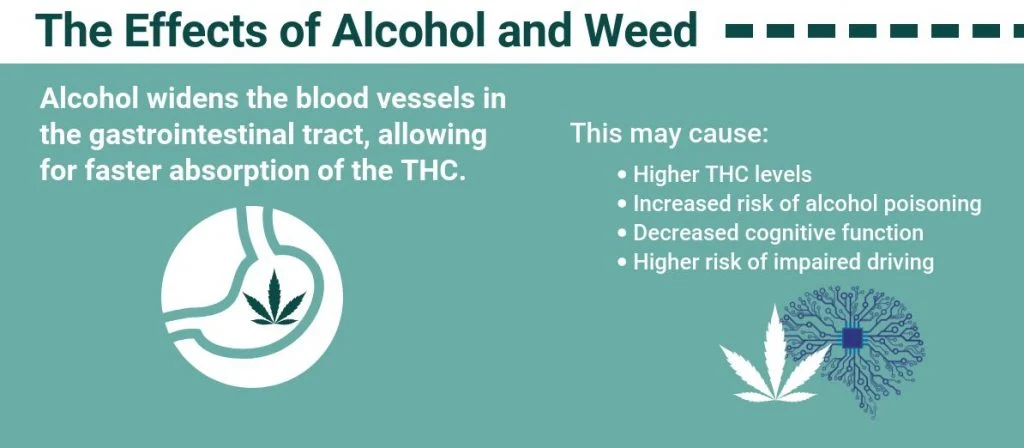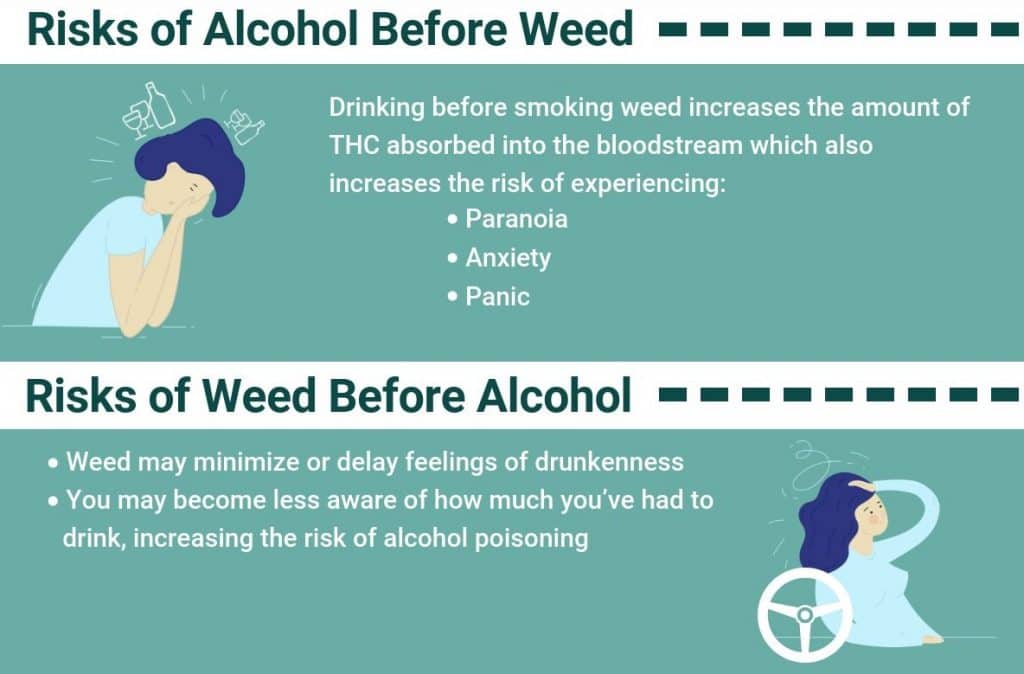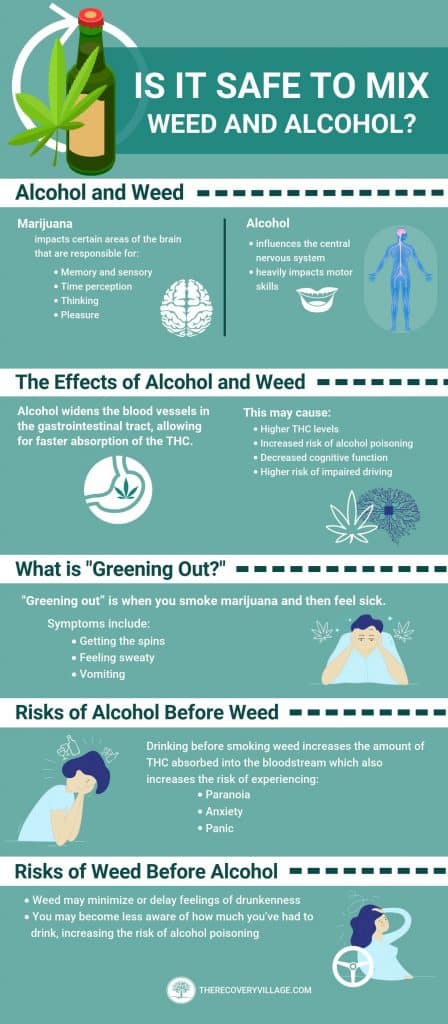People may use alcohol and marijuana together, but their combined effects can increase your risk of higher THC levels, greater impairment and alcohol poisoning.
It is common for people to mix alcohol and marijuana. In fact, marijuana is the most frequently used substance among drinkers. People may use a combination of these substances to get more of an effect for both or combat the side effects of one or the other, but it can be risky and unsafe.
Article at a Glance:
- Using alcohol and marijuana in combination increases your risk of experiencing uncomfortable side effects due to increased absorption of THC.
- Using a combination of alcohol and marijuana can lead to a greater degree of impairment than either on its own.
- When you combine alcohol and marijuana, you’re more likely to experience “greening out,” which is a sick feeling following the use of marijuana.
- Using marijuana and alcohol in combination can make alcohol poisoning more likely, which can be life-threatening.
The Effects of Mixing Alcohol and Marijuana
When someone uses alcohol and marijuana together, they might start to notice they feel the effects of one (or both) much more quickly and more pronounced than otherwise.
Marijuana and alcohol both impact the central nervous system. Marijuana impacts areas of the brain responsible for memory, thinking, pleasure and perceiving time and senses. Alcohol is a depressant that affects the entire central nervous system, heavily impacting motor skills, judgment, cognition and memory.

One of the main active ingredients in marijuana is tetrahydrocannabinol (THC). THC and alcohol are both psychoactive. THC acts on cannabinoid receptors in the brain, which can lead to cognitive effects and impairments.
Treatment Can Be Life Changing. Reach out today.
Whether you are struggling with addiction, mental health or both, our expert team is here to guide you every step of the way. Don’t wait— reach out today to take the first step toward taking control of your life.
When people drink and smoke marijuana together, alcohol increases the amount of THC that is absorbed into the body. While this means that people who use an alcohol and marijuana combination may report a “higher high,” the lows can also become amplified. For example, impaired judgment symptoms are more obvious.

What Are the Risks and Dangers of Mixing Weed and Alcohol?
While people might use a combination of alcohol and marijuana to experience a more intense high, this can be dangerous. The effects of marijuana and alcohol on their own are unpredictable, and combining them makes this worse. You can absorb THC more quickly when there’s alcohol in your blood, which can increase the risk of experiencing uncomfortable side effects.
Combining the two substances also leads to a greater degree of impairment than taking either one on its own. This can increase your risk for accidents and injury. You may put yourself in risky or dangerous situations if you’re drinking or using marijuana, and an alcohol and marijuana combination makes this even more likely.
It’s also important to note that if you regularly use an alcohol and marijuana combination, you’re at a higher risk of developing a dependence on one or both of the substances. Further, if you try to cut back on either alcohol or cannabis, your reliance on the other substance is likely to increase.
A recent study has also shown that those who consumed alcohol had much higher levels of THC in their bloodstream compared to a placebo group. So if you’re planning to detox from marijuana, drinking alcohol is not advised.

What Is “Greening Out,” aka Getting “Cross-Faded”?
Mixing alcohol and marijuana can lead to an experience commonly referred to as getting “cross-faded.” In essence, cross-fading means feeling both the psychoactive effects of cannabis and the intoxicating effects of alcohol at the same time. This can happen with marijuana use on its own, but with an alcohol and marijuana combination, it’s more likely to happen due to the higher THC levels when you drink. While some people intentionally seek out this combination, it can be unpredictable—one substance can amplify the other’s effects, leading to stronger intoxication than either substance alone.
A related term, “greening out,” specifically refers to the negative reaction that can occur when someone consumes too much marijuana—often in combination with alcohol or other substances. Signs of greening out might include nausea, dizziness, paranoia, or a general feeling of discomfort and anxiety. While greening out can happen from overconsumption of cannabis alone, combining weed with alcohol often raises the risk of this unpleasant experience.
Other Slang Terms for Mixing Alcohol and Marijuana
- Cross-Faded / Crossfaded: The most common term, indicating that a person is both drunk and high.
- Twisted: Another casual way to describe being under the influence of multiple substances, though it can apply to substances besides alcohol and cannabis.
- Crunk: Historically associated with hip-hop culture (“crazy” + “drunk”), but also used by some to imply a mix of being both high and drunk.
- Faded / Double Faded: “Faded” is sometimes used to mean high on cannabis alone, but “double faded” implies a combination of intoxications.
- Lit & Loaded: A playful phrase indicating someone is “lit” (high or drunk) and “loaded” (heavily under the influence) all at once.
- Zooted: Depending on the context, “zooted” can refer to being extremely high, but some people use it to describe being both high and drunk.
How To Handle a Bad Reaction
If a person has been drinking and smoking weed, higher THC levels in their blood from drinking may increase the risk of a bad reaction. Because physical and mental impairment can be more pronounced when you combine cannabis and alcohol, it can be hard to know if someone’s symptoms are due to a marijuana green-out or excessive alcohol intake.
Because alcohol poisoning can be deadly, it is best to seek medical attention to make sure that your symptoms are not due to a dangerous blood alcohol level.
While awaiting medical attention, it is important to keep the person safe from harm. This includes preventing injury and providing reassurance and emotional support.
Can You Overdose On Alcohol & Marijuana?
Another risk of an alcohol and marijuana combination is that you may take too much of either substance. Although using too much marijuana isn’t usually life-threatening, inhalation burns and asthma attacks from smoking cannabis can be deadly.
Drinking too much alcohol can be lethal. If you’re using an alcohol and marijuana combination, you can be more likely to get alcohol poisoning, which can be fatal.
When To Get Help
It is important to seek emergency medical help if you suspect a person is experiencing alcohol poisoning. Because a person becomes more impaired when they mix THC and alcohol, it can be hard to tell if a person is reacting to too much drink or too much cannabis. The signs of alcohol poisoning include:
- Confusion
- Problems staying conscious
- Vomiting
- Seizures
- Slow or irregular breathing
- Slow heartbeat
- Clammy skin
- Dulled reflexes
- Bluish or pale skin color
Alcohol poisoning can be fatal. If you suspect someone is experiencing alcohol poisoning, call 911 immediately. Do NOT be afraid to seek help.If you do not have access to a phone contact Web Poison Control Services for online assistance.
You shouldn’t mix marijuana and alcohol. If you think you’re abusing these or other substances, help is available. Contact us to speak with an intake coordinator who can answer your questions and help you understand what options may be available to you.









